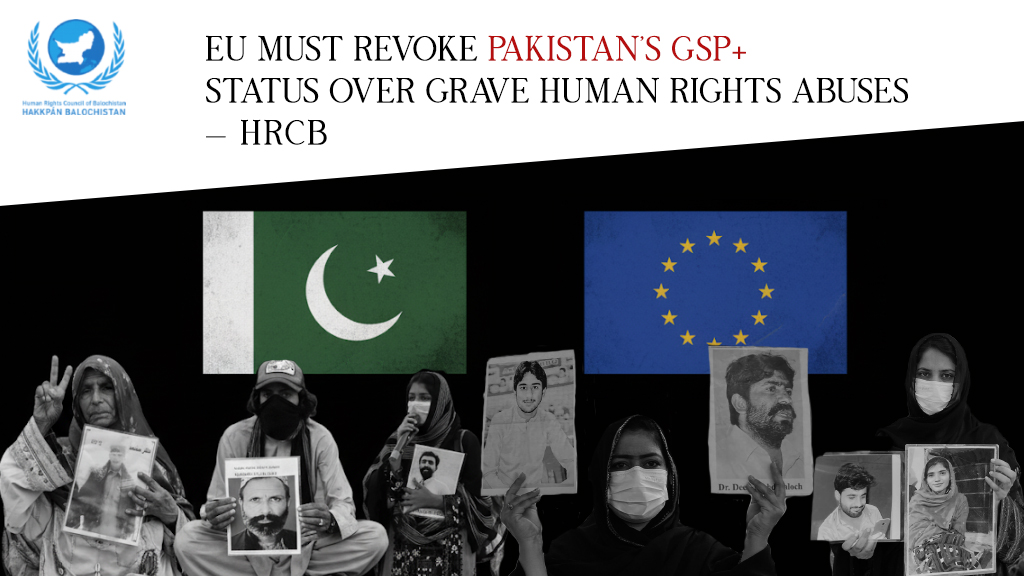EU must revoke Pakistan’s GSP+ status over grave human rights abuses – HRCB
The Human Rights Council of Balochistan (HRCB) calls upon the European Union’s GSP+ Committee to revoke Pakistan’s beneficiary status under the Generalized Scheme of Preferences Plus (GSP+). Since 2014, Pakistan has reaped the trade benefits of GSP+ while consistently failing to uphold its binding commitments to core international human rights conventions, including the ICCPR, CAT, and CRC.
Balochistan, the country’s largest yet most exploited province, illustrates the depth of Pakistan’s non-compliance. While its vast natural resources are systematically extracted, the indigenous population is deprived of essential rights and services—clean water, healthcare, education, and, most fundamentally, the right to life with dignity in their own homeland. Peaceful dissent against this systemic marginalization has been met with militarized repression, enforced disappearance, torture, and extrajudicial execution.
HRCB has formally submitted its report to the EU GSP+ Committee, covering verified incidents from January 2016 to June 2025. The report documents a consistent pattern of grave human rights violations in Balochistan that rise to the level of crimes against humanity. The finding of the report is as follows:
- At least 6744 individuals have been subjected to enforced disappearance from their homes in front of family members, by security forces.
- At least 2559 persons were reported released after severe torture in military’s torture cells.
- At least 215 previously disappeared persons were later found dead, many exhibiting grave signs of torture, 173 others killed in fake encounters and 231 persons were killed by forces during different military operations and other incidents.
- Recently, the government has started burying these bodies[1] without establishing or revealing their identities.
- Hundreds of human remains were discovered in different mass graves,[2] where a few persons were identified as the ones the security forces had abducted [3] and disappeared, while rest of bodies were buried [4] by security forces without stablishing their identities. [5]
- Public institutions, especially schools[6] and community spaces, have been commandeered by security forces and converted into military camps, disrupting civilian life and education.
- Hundreds of villages have been forcibly evacuated,[7] torched, and looted during military operations, particularly in areas along the CPEC route, displacing tens of thousands of people by force.
- Political and human rights gatherings are attacked[8] with brute force, activists are shot and killed, many booked in bogus cases, female HRDs are manhandled, beaten in public.
- HRDs are arrested and kept in illegal detention,[9] not given right to trial.
- Students from Balochistan studying in other cities[10] of Pakistan i.e., Punjab, Islamabad and Sindh are frequently subjected to racial profiling, harassment, enforced disappearances, custodial torture, and in some cases, extrajudicial killings.
- Police refuses to file any case, (disappearing or killing) against security forces and its personnel.
- Courts do not take notice on any case against the security forces and would provide legal supports to the military’s repressive policies.
- The Commission of Inquiry on Enforced Disappearances remains ineffective.
- No military or intelligence official has been held accountable for violations, and access for UN Special Rapporteurs or independent investigators continues to be denied.
Recommendations
HRCB respectfully urges the EU to:
- Trigger a formal compliance investigation under Article 15(1)(a) of the GSP Regulation.
- Suspend or revoke Pakistan’s GSP+ status until verifiable milestones in human rights protection and right to remedy are achieved.
- Establish independent EU monitoring mechanisms that engage directly with civil society and victims in Balochistan.
- Require transparent environmental and social impact assessments for all major projects.
- Demand Pakistan ratify and implement the International Convention for the Protection of All Persons from Enforced Disappearance.
- Prioritize benchmarks on enforced disappearances, extrajudicial killing prosecution, gender-based violence prevention, education restoration, healthcare access, and public service accountability.

